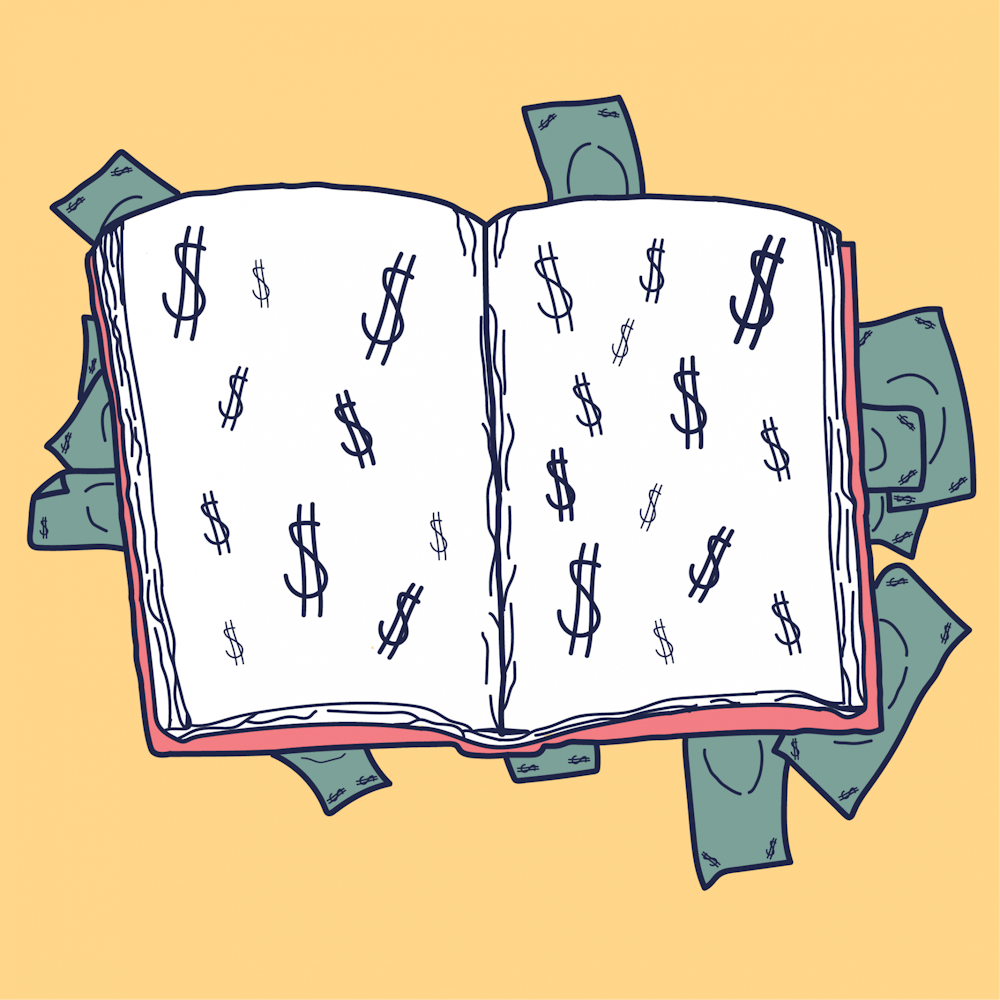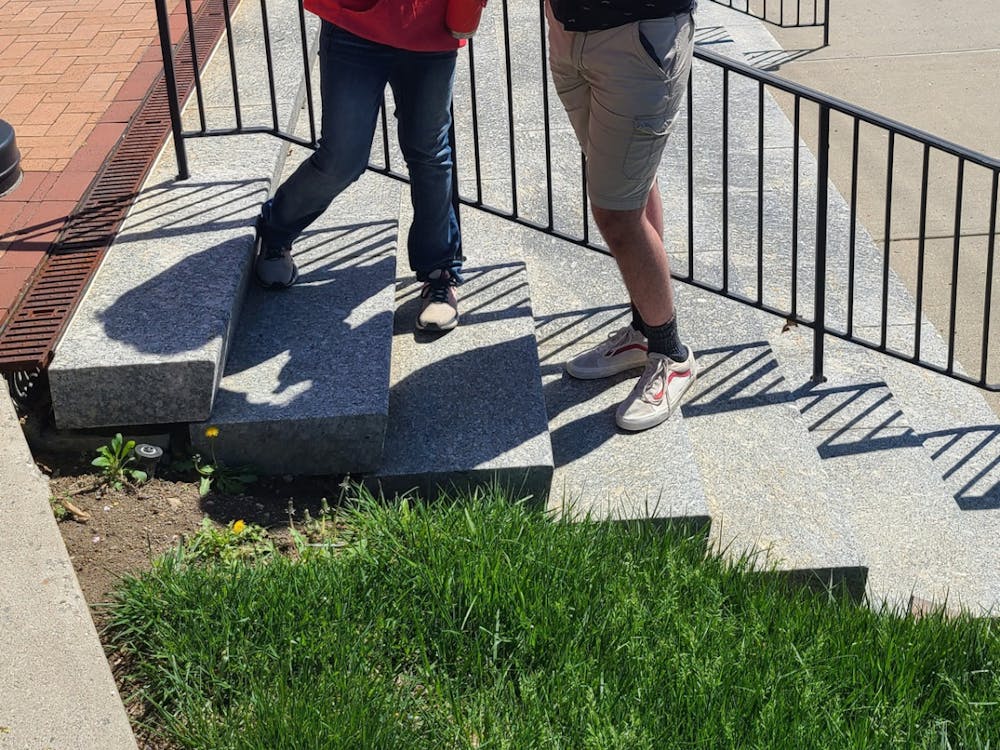This story was originally posted on Aug. 18, 2022.
College is expensive, and textbooks are no exception.
With college textbook prices rising more than 1000% from 1977 to 2015, some students believe the prices of textbooks are a bad deal at best, and at worst, completely ridiculous.
To deal with these high prices, students at Miami University have used different methods to save money. Some are smart, and some are risky, some legal and some not. Here are three methods for saving money on textbooks that some students have used to great effect.
Method One: Find a Better Deal
For Ethan Boley, junior microbiology major, skipping the campus bookstore and buying directly from the publisher is the way to go.
“For my genetics class, I have to buy the fifth edition of a textbook. [The campus bookstore] has it available for about $160 or $111 used,” Boley said. “But I can just go to Amazon or straight to the publisher, and instead of those prices [the textbook] is just $92.”
Boley said he uses this method to save money on many of his required textbooks but cautioned that it’s good to check with the professor before buying from a different website.
“The danger [of buying from another website] is, of course, that the book that you're buying isn’t exactly the one on the Miami Brick and Ivy website and doesn’t have the exact access code or something,” Boley said. “You almost want to wait to ask the professor and be like, ‘Hey, this is what I’m buying, is this okay?’”
Ben Bross, a junior mathematics major, tries to find used editions of textbooks whenever he can.
“Buying used is always a good option,” Bross said. “I also double-check if a professor is like, ‘You need this [specific] edition,’ and if not, I always try to buy older textbooks with the same exercises in them.”
For getting used books, Bross also recommends skipping the Miami University bookstore.
Enjoy what you're reading?
Signup for our newsletter
“Take a few seconds to look past the Miami bookstore,” Bross said. “A good website is Thriftbooks.com, and Amazon sometimes has decent deals on used textbooks.”
In an email to The Miami Student, the Miami Ecampus bookstore wrote that they “can't speak on other company's [sic] pricing and policies” regarding the prices of textbooks on the online store.
There are also multiple websites where students can compare prices, such as Slugbooks or Bookfinder.
Method Two: Get books for Free
Some students aren’t satisfied with saving a few dollars on their textbooks.
Instead, they become pirates.
Internet piracy is a crime defined as using the internet to illegally copy content that is copyrighted by someone else. While some websites, like project Gutenberg, are fair use, others such as z-library are generally not.
A senior computer science major who preferred to remain anonymous because of his use of these illegal websites said he saved a lot on textbooks last semester employing this method.
“I don’t know if I bought a single textbook last semester,” he said. “I just looked up the ones I could find online — the strategy is always to just search up the name of the textbooks and you do .pdf after, and it’s usually posted somewhere online.”
One student majoring in physics and philosophy said another way to get free books was to use the library.
“I’ve never bought books for any of my humanities classes,” he said. “I just rent them from the library. Since you can’t scribble on those books, I just take notes on my computer or annotate them with post-it notes.”
The student said that at the end of the day, there was no shame in resorting to piracy.
“[If I can’t use the library], I can try to use z-library,” the student said. “My tip for students is to just use the library, but go illegal if you have to.”
Method Three: Don’t do Anything
While getting cheaper books or pirating them are generally the popular ways for students to save money on their textbooks, there is one other method: don’t get the textbook at all.
When he isn’t pirating them, that is exactly what the anonymous computer science major tries to do.
“It’s just dumb that I have to pay that much money for books,” he said. “I usually just try to avoid getting the textbook at all because I probably won’t read it anyway.”
He did provide some strategies to do this with less risk to one’s grade, however.
“Usually, you don’t even need a textbook in a lot of classes,” he said. “Before looking at books to get, I look at Rate My Professor to see if the book is actually mandatory because sometimes reviews will show that it isn’t.”
Another way to potentially save money on buying a textbook is simply waiting a week to see what books are actually required, especially if students are confused about what books to purchase.
“If you have questions regarding which textbook to buy or anything regarding what’s best for you, I would recommend emailing the professor and asking them,” Boley said. “However, professors almost always discuss what they expect every student to have on the first day of class … Waiting to purchase [textbooks] until after the first lecture might be advisable for many students who are unsure about what to purchase for their class.”
Why Have Textbooks in the First Place?
Assistant professor of economics Carla Nietfeld said requiring an online textbook helps her students learn the material better and succeed in class.
“In order to learn something you need to be exposed in different ways over and over again,” Nietfeld said. “[My students] see the material in class with me, read it in their e-textbook, look at videos in the chapters and use two different online homework tools … [They are] exposed in a lot of different ways because students learn in different ways.”
Nietfeld also said the online textbook helped her track the progress of students in her introductory-level economics class, Economics 201 and 202.
Amanda McVety, a professor of history, agreed that textbooks can help students get crucial contextual information when taking an introductory-level course. She doesn’t require textbooks in some of her upper-level courses but found that requiring a textbook for an entry-level American history course helped with student learning.
“[Students] read a chapter and took low-stakes quizzes every week, and I wouldn’t at all reiterate the chapter and instead explore specific issues during lecture,” McVety said. “Having an e-textbook gave them context and access to primary sources … It seems to actually help them better see the bigger picture, so I’ve stuck with it.”
Both professors encouraged students wanting to save money to go ahead and do it. Nietfeld recommended taking the same professor and seeing if they required the same textbook for a subsequent class, while McVety advised trying to get textbooks from King library if possible.
The Miami Student does not endorse the usage of any illegal methods to acquire textbooks.




